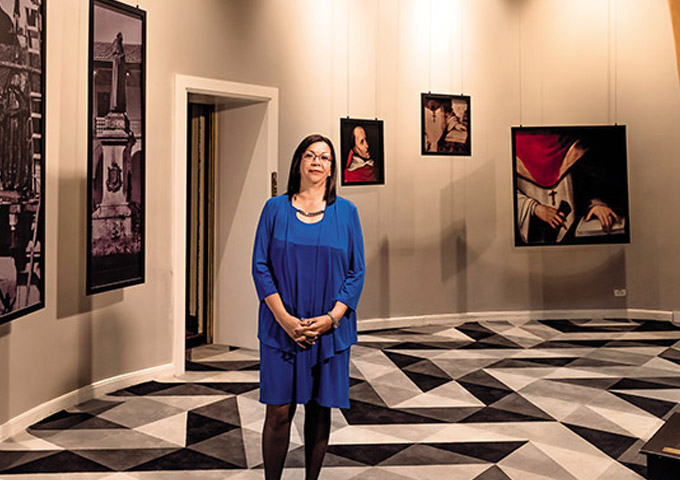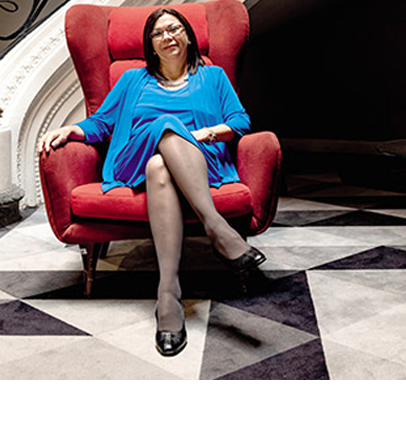Beatriz Londoño, committed to defend human rights
By: Juliana Vergara Agámez
Photos:
Society and Culture

By: Juliana Vergara Agámez
Photos:
Born in Antioquia, a lawyer by profession and part of the Universidad del Rosario by adoption. These are some of the characteristics that could identify the Emeritus Professor Beatriz Londoño, who had the classrooms and corridors of the Universidad del Rosario as her second home for twenty years. However, other words define her as a professional: Human rights defender and pioneer.
“I believe I am a pioneer, with great humility. Life gave me the opportunity to start things. I like that word. Pioneer is not only the one who gives a new idea, but who can develop and follow it up,” she reflects, while having a cup of coffee in the tranquility of her home, in Santa Marta (Magdalena). There she lives as a retiree, and this has allowed her to resume music and exercise, two activities that she had left standing by for the day-to-day life of the academy.
Professor Beatriz was a member of the editorial committee that presented the magazine Socio-Legal Studies in 1998, was the creator of the Public Action Group (GAP, in Spanish), promoter of the Master of Law with an emphasis on Human Rights and Transitional Justice, and founder of the Sociolegal Network, among many achievements in the long list of actions that she began at the Universidad del Rosario. For this reason, she has made history in it since her arrival at the Research, Studies, and Consulting Center (Ciec, in Spanish)— with the cooperation of the jurist Ovidio Oundjián (RIP), considered an illustrious member of the Universidad del Rosario for his contributions for almost four decades to this alma mater.
A year after entering the university, Professor Beatriz was part of the Public Law Group led by the lawyer Carlos Ariel Sánchez, and she coordinated the Human Rights Protection Mechanisms line at the Faculty of Law, an idea that had the visionary support of the then dean Marco Gerardo Monroy.
“The life of researchers is full of ups and downs, and it takes strength to fight for innovative ideas. And we always learn a lot in the process,” says the professor. She carried out everything because she was convinced of the obligation of the academy in general and the Universidad del Rosario in particular to bet on the research of the country’s biggest problems. For this reason, she also advocated the creation of the Human Rights Research Group. “It was 2003, there was a very strong opposition, which posed great difficulties,” she recalls. In the end, not only did she achieve that purpose but also, as the leader of this new group, she managed to position it in Colciencias (the governing body of science in Colombia, today is the Ministry of Science, Technology, and Innovation) in the highest category. She participated in the creation of the elective area of Human Rights to influence undergraduate teaching at the Faculty of Law. An episode that she sums up with a phrase as follows: “I have been very happy at university; it has allowed me to use creativity to train and research human rights.”
supports in the proposals that she considers they contribute to the academy. For example, in 2004, when two of them came to her office to tell her about the “novelty” of the research incubators, she accompanied them to speak with the university authorities and supported them so they could attend a meeting in Cali where they could learn about the experiences of other universities in this matter. They traveled and returned to be the founders of the incubator.
Beatriz Londoño Toro was named emeritus professor, one of the highest distinctions awarded by the Universidad del Rosario to outstanding professors, including people from outside the institution.

“The life of researchers is full of ups and downs, and it takes strength to fight for innovative ideas. And we always learn a lot in the process,” says researcher Beatriz Londoño.
A long journey
In the list of achievements in the defense of human rights of the emeritus Professor Beatriz Londoño, the following ones stand out:
-Advisor to the Presidential Council for Human Rights
-Delegate advocate for Collective Rights of the Defensoría del Pueblo (Ombudsman's Office)
-Deputy magistrate of the Contentious Administrative Court
-Vice president of the District Human Rights Committee of Bogotá, as representative of the president of the Universidad del Rosario
-Distinguished professor and emeritus professor of the Universidad del Rosario
-Director of the Research Group on Human Rights
-Senior researcher at Colciencias, today Ministerio de Ciencia, Tecnología e Innovación (Ministry of Science, Technology and Innovation)
-In 2013, her sabbatical year, Beatriz Londoño wrote the book Legal Clinic Education and Strategic Litigation in Ibero-America, which is available at: https://bit. ly/2LM2NLv
-Many of her articles are published in indexed journals. She highlights her work in the journal State Law, in which she presented the results of an investigation with the Universidad de Málaga (Spain) entitled Gender violence has no borders. Comparative research on Colombian and Spanish regulations regarding gender violence (2004-2014), which can be found in this link: https://bit. ly/2AFOsOm
Advocate by vocation
Professor Beatriz discovered her interest in defending human rights very early, when she was at the school of nuns La Presentación, in her native Medellín. There she not only directed the student music group but also was a leader who fought to defend others, so hard that she almost ended up being expelled for displaying a poster with complaints and reports from her classmates, something that greatly annoyed the nuns. Then, she already knew that her path was to study Law, a course of studies that she studied at the Universidad Pontificia Bolivariana, where she later worked as a professor.
Su rumbo cambió en 1984, cuando ganó la beca Centenario de la Constitución de 1886, que concedió el Banco de la República. Tras dos años fuera del país, obtuvo el Doctorado en Derecho de la Universidad Complutense de Madrid (España), con el trabajo Las garantías constitucionales frente al desafío informático. Un hecho que ocurrió “cuando en Colombia nadie hablaba de eso”, como recuerda sonriendo, pues los doctorados no eran conocidos en el país en ese momento. Por ello, el reto fue doble: explicar qué era un doctorado y qué era informática. “Los temas informáticos eran algo de otro mundo, nadie entendía lo que yo estaba haciendo”, dice.
Her course changed in 1984 when she won the scholarship Centenary of the Constitution of 1886, which was awarded by the Banco de la República (Central Bank of Colombia). After two years abroad, she obtained a Doctorate in Law from the Universidad Complutense of Madrid (Spain), with her work Constitutional guarantees in the face of information technology challenges. Something that took place “when no one talked about it in Colombia,” as she remembers smiling since doctorates were not known in the country at that time. Therefore, the challenge was twofold: To explain what was a doctorate and what was computer science. “IT topics were something from another world, nobody understood what I was doing,” she says.
Upon returning to Colombia, after a brief return to the Pontificia Bolivariana, she joined the Alta Consejería Presidencial para los Derechos Humanos (High Presidential Council for Human Rights), under the direction of the lawyer Álvaro Tirado Mejía, in 1988. It was an instance that was just beginning, and therefore, she was part of the first acting team. Her mission was to systematize the complaints that arrived, via telegrams or calls, to the Presidencia de la República (Presidency of the Republic) precisely in one of the most painful periods in recent national history due to three phenomena that the country was going through: Narco-terrorism, paramilitarism, and guerrillas. An explosive mixture that left hundreds of dead, displaced, and injured people. The professor underwent one of her most intense experiences, which left her the best memory, because she helped to save many lives.
Her work in the public sector continued as part of one of the preparatory commissions of the National Constituent Assembly, in 1990, and later in the new Defensoría del Pueblo (Ombudsman's Office) from 1992. Upon leaving this entity, she arrived at the Universidad del Rosario.
Among her achievements in this alma mater, in addition to the research and consolidation of the Human Rights area at the Faculty of Law, she is recognized as a Senior Researcher at Colciencias and as emeritus professor in 2019, a distinction that only a few women receive.
Always contributing to the university
For several years, Professor Beatriz Londoño and her family decided that someday, they would move to Santa Marta. So, in this new chapter of her life, which she began only at the beginning of 2020, she combines her virtual classes with the direction of graduate theses in a warm climate and close to the sea.
In her work, an idea comes to her head and she is already shaping it: The role of distinguished and emeritus professors as a thinking center of older people so that they continue to contribute to the university and the country. This idea emerged in conversations with the Instituto Rosarista for the Study of Aging and Longevity, which is led by the School of Medicine and Health Sciences.
She also continues to think about collective rights and the urgency of new mechanisms for the defense of human rights: Thoughts that she shares with her colleagues and students, to whom she leaves the path that she has built because she is sure that “generational change is key” to continue moving forward. Her former students prove it. Today, they stand out in academia as professors or researchers in law firms and public institutions. For them, there are only words of affection, as she never ceases to amaze “the human quality and sensitivity of the Universidad del Rosario students. They are a great strength of the university because they reflect its commitment to society.”